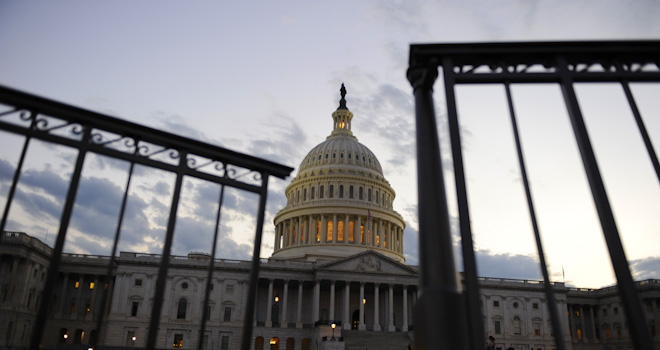If all goes well in Washington today, then shortly after noon the nation’s debt ceiling crisis should be over. Around that time the Senate is due to take up last-minute legislation that the House passed Monday night.
Senate leaders seem confident they have at least the 60 necessary votes to carry the deal. If they’re right, then the final bill would move swiftly to the President’s desk for his signature. Once the ink is on the page, the the debt ceiling can be raised ahead of the nearing deadline, and the ticking timebomb of default will be defused.
It will be the end of a dangerous game of chicken that shook markets across the world as creditors faced up to the possibility that for the first time in its history America might fail to pay its credit obligations.
The chances of that happening dropped dramatically shortly after 7pm Monday, when the House passed the debt legislation by a vote 269-161. It was a controversial deal that many voted for unhappily, recognizing it was perhaps their last chance to halt a national leap into the unknown. Though the bulk of Republicans ultimately voted in favor by a tally of 174-66, the Democrats fractured right down the middle: 95-95. Intriguingly, the Republicans’ so-called “Tea Party Caucus,” which was reportedly described by Vice President Joe Biden as having acted like “terrorists,” also split fairly evenly: 32-38.
Although these numbers mean the immediate threat of default may be passing, other problems await. Earlier in the crisis President Obama had pushed the idea of a “grand bargain” which, in return for a substantial raising of the debt ceiling, would also lay a plan for lopping at least $4 trillion off the national debt over ten years.
Under fire from both Republicans and Democrats, that plan died an unceremonious death. The final bill reduces the deficit by almost half of the grand bargain’s amount: enough to anger liberals who see it as a betrayal of social welfare programs, but not enough to satisfy conservatives who do not believe it puts the nation’s fiscal house in order.
That’s a concern that could also trouble international credit ratings agencies. America currently enjoys a super-sound AAA rating, but several major agencies have warned this deal may not be enough to avoid a downgrade. If that were to occur the shock would not be cataclysmic, as defaulting would have been, but it would nonetheless be bracing. It would almost certainly lead to a rise in interest rates, meaning Americans across the board would feel the pain on a daily basis.
But before we fret about that, we have to get past Tuesday’s Senate vote. One of the most unnerving trends of this crisis has been the tendency for hugely ballyhooed votes to slip. Though it’s hard to think what procedures they might use to block the bill, fierce opposition could come on one end of the spectrum from Vermont’s Independent Senator Bernie Sanders, and at the other end from Republican hold-outs such as Lindsey Graham (SC). Indeed, late Monday night, Graham vowed in his twitter feed, “I’ll try everything I can to unravel this deal.” Come high noon viewers from around the world will be watching the Senate floor, and also glancing nervously at any nearby ticking clocks.









